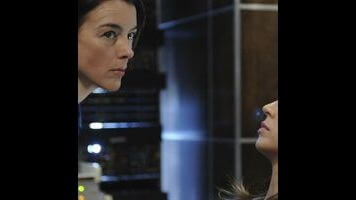Dollhouse: "Ghost"

(Note: I’ll be writing about Dollhouse every week for TV Club, but since this review is being posted before tonight’s premiere, I’ve tried to avoid discussing any third-act twists and turns that might spoil the episode for those who haven’t seen it yet. In future weeks, everything is up for discussion.)
By now, it’s no secret that Joss Whedon’s Dollhouse is a wounded duck. The original pilot was thrown out and completely retooled. Subsequent episodes have been shifted around in different orders. The initial plan to air the show on Mondays, in a high-profile time slot, was also changed, and the show was pushed back to the hinterlands of Fox Fridays, where it’s running in tandem with the dwindling Terminator: The Sarah Connor Chronicles. All of which has Whedon fans worrying that Dollhouse is doomed to be the next Firefly, a cult show that won’t be given a chance to find its audience. The “save our show” campaigns began as early as May 2007.
Keeping all that in mind, it’s perhaps healthiest to watch Dollhouse’s debut episode, “Ghost,” with an eye towards the show’s long-term potential than fuss too much over its current shortcomings. Whedon’s series have traditionally stumbled out of the gate before finding their groove later on—though having caught up with Firefly in its original order on DVD, I think that one is close to perfect from the start—and much like its protagonist, Dollhouse has some identity problems. To name a few: Is this a J.J. Abrams show or a Joss Whedon show? Is it episodic television or serialized television? Can an actress of seemingly limited range like Eliza Dushku keep reinventing herself anew week after week?
Pitched somewhere between Abrams’ Alias and Eternal Sunshine Of The Spotless Mind, Dollhouse has a complicated premise (usually fatal in network television), but one rich in thematic possibility. The “Dollhouse” of the title is a high-tech, top-secret facility that houses a stable of operatives known as “Actives” or “Dolls,” who are essentially blank slates that can be imprinted with other personalities and skill sets. For example, if a wealthy client needs a date for a weekend or a hostage negotiator (to name tonight’s temporary occupations), and values discretion, they call upon this underground service to get the job done. Dushku plays an Active named Echo, who’s committed to the operation for five years, though the reasons for her indoctrination remain unclear. Rounding out the cast of characters is her handler Boyd (Harry J. Lennix), an ex-cop who plays Giles to her Buffy; Adele (Rushmore’s Olivia Williams), the coolly sophisticated woman who runs Dollhouse; Topher (Fran Kranx), the brilliant young techie responsible for wiping the Actives’ minds after a job; a badass new Active named Sierra (Dichen Lachman); and Paul (Tahmoh Penikett), an FBI agent intent on finding and exposing Dollhouse as a human trafficking operation.
The pre-credits sequence finds Echo nearing the end of a whirlwind three-day weekend on the arm of a client named Matt. In short order, Whedon establishes a few important details: The Groundhog Day-like reality of Actives who accumulate all sorts of real experience over a brief period, only to have it erased from their memories; the specific compatibility Actives have to the situation (or, in this case, the client) at hand; and the details that can linger in their memories even after they’ve ostensibly been wiped away. It’s this last part that’s most intriguing (and most reminiscent of Eternal Sunshine Of The Spotless Mind), because these ghosts in the machine will keep the show from hitting the reset button every week. When Adele talks to Echo about starting with a “clean slate” in the opening scene, Echo replies, “You ever try to clean an actual slate? You always see what was on it before.”

 Keep scrolling for more great stories.
Keep scrolling for more great stories.